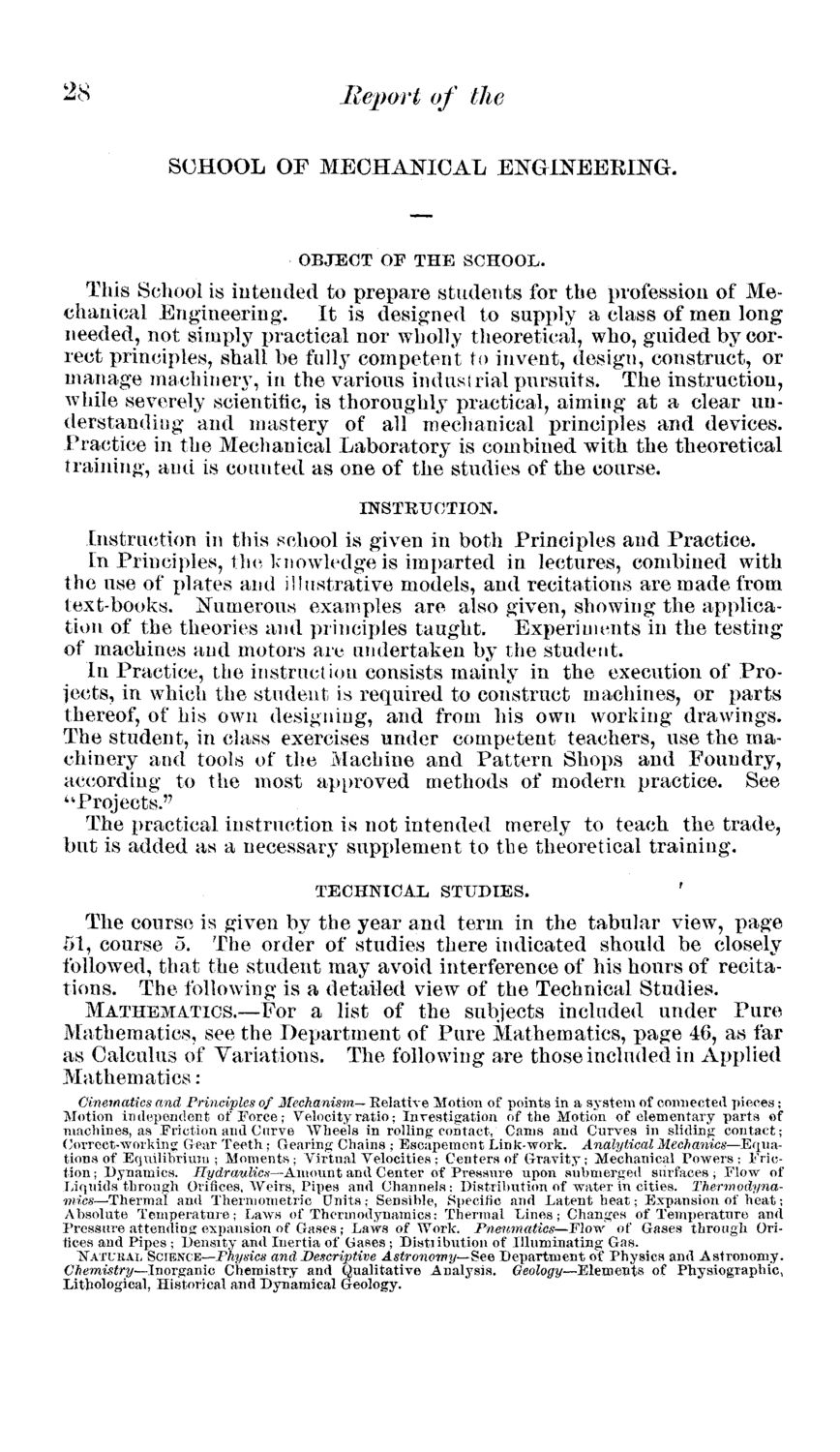| |
| |
Caption: Board of Trustees Minutes - 1874
This is a reduced-resolution page image for fast online browsing.

EXTRACTED TEXT FROM PAGE:
28 Report of the SCHOOL OF MECHANICAL ENGINEERING. OBJECT OF THE SCHOOL. This School is intended to prepare students for the profession of Mechanical Engineering. It is designed to supply a class of men long needed, not simply practical nor wholly theoretical, who, guided by correct principles, shall be fully competent to invent, design, construct, or manage machinery, in the various industrial pursuits. The instruction, while severely scientific, is thoroughly practical, aiming at a clear understanding and mastery of all mechanical principles and devices. Practice in the Mechanical Laboratory is combined with the theoretical training, and is counted as one of the studies of the course. INSTRUCTION. Instruction in this school is given in both Principles and Practice. In Principles, the knowledge is imparted in lectures, combined with the use of plates and illustrative models, and recitations are made from text-books. Numerous examples are also given, showing the application of the theories and principles taught. Experiments in the testing of machines and motors are undertaken by the student. In Practice, the instruction consists mainly in the execution of Projects, in which the student is required to construct machines, or parts thereof, of his own designing, and from his own working drawings. The student, in class exercises under competent teachers, use the machinery and tools of the Machine and Pattern Shops and Foundry, according to the most approved methods of modern practice. See ^Projects." The practical instruction is not intended merely to teach the trade, but is added as a necessary supplement to the theoretical training. TECHNICAL STUDIES. ' The course is given by the year and term in the tabular view, page 51, course 5. The order of studies there indicated should be closely followed, that the student may avoid interference of his hours of recitations. The following is a detailed view of the Technical Studies. MATHEMATICS.—For a list of the subjects included under Pure Mathematics, see the Department of Pure Mathematics, page 46, as far as Calculus of Variations. The following are those included in Applied Mathematics: Cinematics and Principles of Mechanis7n— Relative Motion of points in a system of connected pieces; Motion independent of Force; Velocity ratio; Investigation of the Motion of elementary parts of machines, as Friction and Curve Wheels in rolling contact, Cams and Curves in sliding contact; Correct-working (rear Teeth ; Gearing Chains ; Escapement Link-work. Analytical Mechanics—Equations of Equilibrium ; Moments ; Virtual Velocities ; Centers of Gravity; Mechanical Powers ; Friction ; Dynamics. Hydraulics—Amount and Center of Pressure upon submerged surfaces , Flow of Liquids through Orifices, Weirs, Pipes and Channels: Distribution of water in cities. Thermodynamics—Thermal and Thermometric Units; Sensible, Specific and Latent heat; Expansion of heat; Absolute Temperature; Laws of Thermodynamics: Thermal Lines; Changes of Temperature and Pressure attending expansion of Gases ; Laws of Work. Pneumatics—Flow of Gases through Orifices and Pipes ; Density and Inertia of Gases ; Distiibution of Illuminating Gas. NATURAL SCIENCE—Physics and Descriptive Astronomy—See Department of Physics and Astronomy. Chemistry—Inorganic Chemistry and Qualitative Analysis. Geology—Elements of Physiographic, Lithological, Historical and Dynamical Geology.
| |